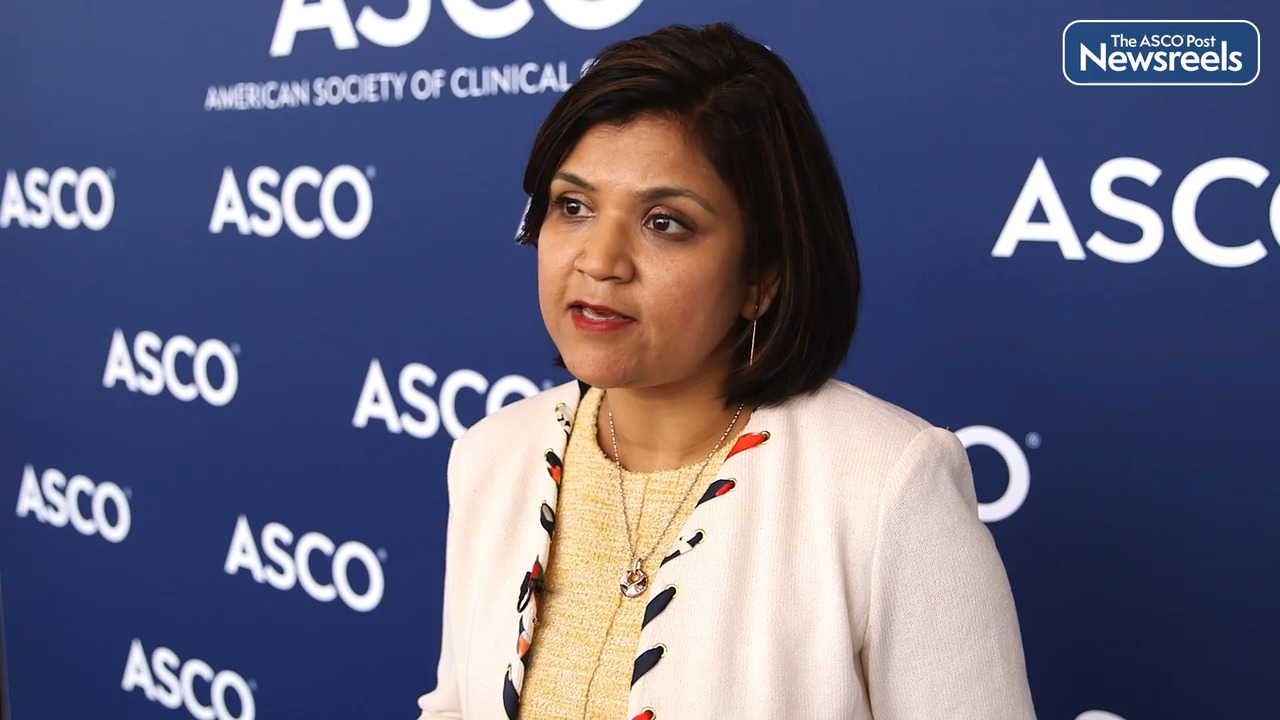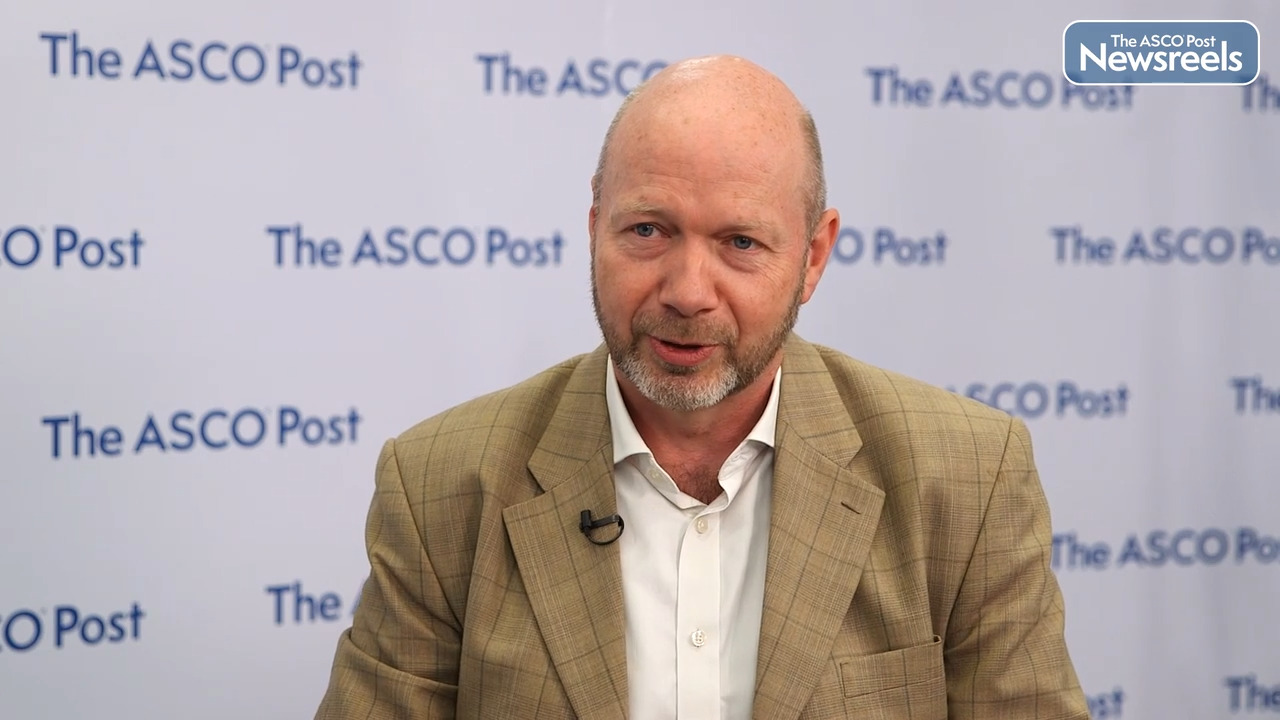Etienne Brain, MD, PhD, on Breast Cancer: Adjuvant Endocrine Therapy With or Without Chemotherapy in Older Patients
2022 ASCO Annual Meeting
Etienne Brain, MD, PhD, of the Institut Curie, discusses phase III findings from the Unicancer ASTER 70s trial, in which patients aged 70 or older with estrogen receptor–positive, HER2-negative breast cancer and a high genomic grade index received adjuvant endocrine therapy with or without chemotherapy. The data did not find a statistically significant overall survival benefit with this treatment after surgery (Abstract 500).
Transcript
Disclaimer: This video transcript has not been proofread or edited and may contain errors.
ASTER 70s study is a landmark study, which has been conducted in older women with luminal breast cancer in adjuvant setting questioning the addition of chemotherapy to endocrine treatment. The rationale behind is that the literature is very limited in terms of data published for the use of adjuvant chemotherapy in this situation in older ones. Multimorbidity competes with cancer on outcome and therapeutic ratio is also more narrow because there are higher risk of side effects in this population.
This trial screened near 2000 patients with the genomic grade index, the GGI, to assess the aggressivity of the disease and to spare the burden of chemotherapy in those patients with low-GGI tumor, while those with a high-GGI tumor were randomized between endocrine treatment alone as a standard arm versus chemotherapy followed by endocrine treatment. Near 2000 patients enrolled, 1,100 randomized between the two arms.
This trial shows, on the primary endpoint, which was overall survival by intent-to-treat analysis, that chemotherapy doesn't add a significant benefit in addition to endocrine treatment. That's the first message of caution from this study. Second one is that we can look at different subgroups and perform also the analysis according to the per protocol concept. This modifies or brings a nuance in the results, but I would say that the final potential benefit on overall survival in this case remains marginal. And in this population of older women, it is a key point and a double cautious message.
The next step for this study will be to try to improve the discriminative capacity of this kind of signature to identify those who could benefit still from chemotherapy, despite these global message and results on overall survival. This will be certainly possible with the use of the mass and the volume of data which has been collected in the randomized groups in this study, because there was a longitudinal collection of geriatric data, quality of life data, and treatment acceptability socioeconomic data, which will be very helpful to modelize differently, the prognosis of these ladies.
That's in the near future, and I think what brings the most in terms of information ASTER 70s, is that on the provisor that you change a bit of rules for inclusion criteria, because in this study we had very flexible inclusion criteria, we made a focus on quality of life and we use a single informed consent for screening and randomization, on the provisor that you facilitate or you simplify the processes, you can run large studies in a vast population, which is very often not considered for clinical trials left behind.
The ASCO Post Staff
Shilpa Gupta, MD, of the Cleveland Clinic Foundation, discusses an updated consensus definition for standard therapy and clinical trial eligibility for patients with metastatic urothelial cancer who are platinum-ineligible, criteria that are proposed to guide treatment recommendations for this population. This may be especially important now that the U.S. Food and Drug Administration has restricted the use of first-line pembrolizumab to those who are considered platinum-ineligible (Abstract 4577).
The ASCO Post Staff
Martin McCabe, PhD, of the University of Manchester, discusses a phase III assessment of chemotherapy for patients with recurrent and primary refractory Ewing sarcoma. The trial, called rEECur, is the first study to provide comparative toxicity and survival data for the four most commonly used chemotherapy regimens in this disease. The analysis showed that high-dose ifosfamide is more effective in prolonging survival than topotecan plus cyclophosphamide (Abstract LBA2).
The ASCO Post Staff
Rainer Fietkau, MD, of Germany’s University Hospital Erlangen, discusses phase III findings of the CONKO-007 trial, which examined the role of sequential chemotherapy and chemoradiotherapy administered to patients with nonresectable locally advanced pancreatic cancer following standard-of-care chemotherapy (Abstract 4008).
Paul G. Richardson, MD, of Dana-Farber Cancer Institute, discusses phase III findings from the DETERMINATION trial, which showed that, for patients with newly diagnosed multiple myeloma, lenalidomide, bortezomib, and dexamethasone (RVd) with or without autologous stem cell transplant (ASCT) and lenalidomide maintenance to disease progression resulted in the longest median progression-free survival reported for each approach, and a highly significant difference in progression-free survival in favor of early transplant. While overall response rates were similar, rates of MRD favored early transplant also, but toxicity was greater and quality of life was transiently but significantly diminished. No overall survival advantage has been observed to date (Abstract LBA4).
The ASCO Post Staff
Ursula A. Matulonis, MD, of Dana-Farber Cancer Institute, and Nicoletta Colombo, MD, of the University of Milan and the European Institute of Oncology, discuss phase II results on the overall survival benefit of intermittent relacorilant, a selective glucocorticoid receptor modulator, combined with nab-paclitaxel, compared with nab-paclitaxel alone in patients with recurrent platinum-resistant ovarian cancer. A phase III trial comparing intermittent relacorilant plus nab-paclitaxel with investigator’s choice of chemotherapy in primary platinum-refractory disease is ongoing (Abstract LBA5503).





